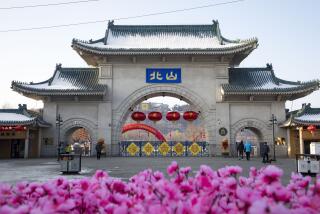Explosions Rock Cafeterias at 2 Chinese Universities, Injuring 9
- Share via
BEIJING — In an unusual burst of campus violence, homemade bombs exploded in cafeterias at China’s two most prestigious universities during lunchtime Tuesday, injuring nine people, according to police and university officials.
The incidents occurred 90 minutes apart on campuses separated by just hundreds of yards.
There were no immediate claims of responsibility.
“Initial police investigations show the two explosions were caused by homemade black gunpowder explosives,” Beijing Public Security Bureau spokesman Liu Wei told reporters.
At 11:50 a.m. Tuesday, the first explosion hit a faculty cafeteria at Qinghua University, injuring six people and sending dozens of others fleeing from the building. State media identified the injured as four faculty members, a teacher from another university and a student from the Beijing Broadcasting Institute.
Witnesses told the official New China News Agency that the smell of gunpowder lingered after the blast.
At 1:20 p.m., another blast shook the first floor of Beijing University’s Farm Garden cafeteria. All three people injured were employees of the cafeteria and were treated at the university’s hospital and another local hospital.
“I had just finished eating there 10 minutes earlier,” said a third-year physics major who gave his surname as Shao. “Students are making all sorts of conjectures about who caused the blast, including the possibility that it was someone dissatisfied with the national college entrance examination system.”
“You can’t really prevent this sort of thing, and you certainly can’t stop eating in the cafeteria because of it,” said a senior math major, who also gave only his family name, Dong. “We just hope the school authorities will try harder to put students’ minds at ease about campus safety.”
The Communist Party Central Committee and the State Council expressed concern about the explosions and ordered law enforcement officials to get to the bottom of them as quickly as possible, the New China News Agency reported.
By dinnertime, both universities’ tree-lined campuses were quiet and orderly. At Beijing University, security was tight, with teams of plainclothes police combing the cordoned-off cafeteria. Small throngs of students milled around, reassuring worried parents or discussing the news among themselves in front of the three-story structure’s shattered glass windows.
China’s leaders have not forgotten that the biggest challenge to their authority in the post-Mao era came during the 1989 pro-democracy demonstrations by college students.
Although many students have since become more focused on personal advancement than on the nation’s fate, authorities remain concerned that nonpolitical issues, such as student safety, could also ignite protests.
In May 2000, Beijing University students defied a ban on unauthorized protests and demanded to hold a candlelight vigil for a female freshman who was raped and murdered. Authorities allowed a memorial service, and the protests ended.
Last month, an estimated 10,000 students at Hefei Industrial University in eastern China protested the death of a classmate who was run over by a truck outside the school’s gates. The driver was quickly arrested, and a pedestrian bridge was built near the school.
More to Read
Sign up for Essential California
The most important California stories and recommendations in your inbox every morning.
You may occasionally receive promotional content from the Los Angeles Times.













